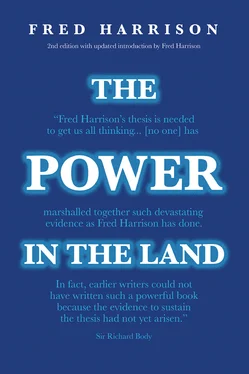The 1980s are the bicentenary of that quantum jump which was the Industrial Revolution. However, that event, unparalleled in the history of mankind, is recalled not for the pleasing possibilities that it offered, but for the exploitation which ruptured economic relationships and generated social tensions. Over thirty million people are jobless in the industrialised countries; hundreds of millions more, dependent upon the prosperity of the metropolitan economies for their jobs, are also tramping the streets in the big cities of the Third World. Those who are fortunate enough to be taking home wage packets at the end of the week are nonetheless living with the constant fear that they are the next to be made redundant.
Entrepreneurs — from the captains of multi-national corporations to the self-employed shopkeepers who keep the wheels of commerce ticking over in the corner shops of our High Streets — are equally vulnerable to the pressures of a seemingly pitiless economic system that appears to jeopardise their material welfare no matter how hard they are willing to work.
Everyone is vulnerable, whether he is a capitalist or worker, whether he lives in the ‘miracle’ economies of West Germany or Japan or the low- productivity countries like Britain. Could it be that the only appropriate response to the malignant forces that undermine the great social institutions and the nuclear family alike is a thoroughgoing revolution — Marxism, perhaps?
The major social and economic friction points derive their existence and logic from the need to compensate for land monopoly, the original structural defect in industrial society. Economists have always skirted around this issue, and have thus been led — by a variety of motives, some honourable (such as humanitarianism), some inspired by the need to protect vested interests — to propose ‘solutions’ that have merely aggravated the problems. For example, 19th century reformers concluded that poverty could be eliminated through a progressive income tax only; this failed, as the large number of poverty stricken families in the rich nations of Europe and North America would testify (in 1981, 30m. citizens of the richest nation on earth, the USA, were officially classified as living below the poverty line).
The phenomenon of poverty accompanying prosperity will continue as a feature of society so long as we continue to ignore the fundamental problem, which is the failure to deal with the malfunctioning of the land market. Myopically, we will respond to immediate difficulties with short-term solutions designed to ameliorate the effects rather than remove the original causes.
Our investigation celebrates the Industrial Revolution in the belief that reform, rather than another revolution, is all that is required to eliminate repetition of those tragic events that are an indictment of European civilisation.
The thesis examined here is that land speculation disrupts the industrial economy by distorting the distribution of income and contracting the supply of land available for homes and factories, shops and offices and farms. But if we are to accept conventional wisdom, our explanation for the latest recession that began in 1974 and continued into the 1980s is pure nonsense. How can land speculators close down factories, shut High Street shops and throw people onto the dole queues?
We are invited to believe that land, which is fixed in supply, is neutral in the process of production. For example, in his quantitative analysis of the growth of real national income in the western economies, Edward Denison of the Brookings Institution assigns a 0.00% value to land as an input. 1 The only recognition that land might have a negative impact arises in relation to per capita income: because the working population is increasing on a fixed amount of land, so land ‘subtracted slightly from the growth of national income per person employed'. 2
From this it follows that the blame for economic recessions cannot be ascribed to those who own the beneficial rights to land. The assumption underlying Denison’s view is that land comes onto the market as and when it, is required by labour and capital, and that it does so at market-clearing prices determined by competition. This is consistent with the classical theory of perfect competition, but its use for analysing the land market as it is at present constituted reveals a tragic gap in our knowledge.
The causal mechanism is crucial to our analysis, but it is one which even diligent students of the land market have failed to identify. Take, for example, the following account of the West German economy. Investment in real estate via property funds became popular in the late 1960s. This interest intensified into a boom in 1971 and 1972. A slump in the land market followed in 1973, and the ‘miracle’ economy went into a deep recession in 1974. Are these events no more than a chronological sequence, purely descriptive and with no explanatory content ?
The popular explanation for the problems of the 1980s has been the OPEC-inspired rises in the price of oil. As a group, only Marxist economists have consistently denied that the oil price boom in late 1973 initiated the global recession in 1974. Their view is verified by the historical facts; but while their alternative explanation is rejected, can we justifiably attribute the burden of responsibility to land speculation? ‘Apparently no one has any defensible idea of the relative import played by speculation in contributing to recent land price booms in Canada, New Zealand, Australia, and elsewhere.’ 3 We have documented the evidence in four cases — the USA, Britain, Japan and Australia — to defend the view that speculation was responsible for the land booms that then provoked the general recession as a result of the unbalanced flow of land onto the market, the distortion in the production costs of firms and the reduction in the spending power of households.
The power to engineer these effects is identified as corrupt. In theory and practice, land monopoly is inconsistent with laissez faire : the free market cannot hope to function effectively if it is undermined by a class of people who are not subjected to the rules of competition. Psychologically, land monopoly stimulates the something-for-nothing attitude which serves no justifiable economic or social purpose. Morally, land monopoly is indefensible because it assigns the power to reap the rewards of other people’s labours.
Past attempts at resolving the instabilities in the industrial system were doomed to failure because attitudes and knowledge had been distorted by the historians, economists and politicians who neglected the crucial role of land in the productive process.
The classical economists defined the production function in terms of three factors: land, labour and capital. This was subsequently simplified to capital and labour. The analytical concepts, conforming to the perceptions of ‘real- world’ economists, were adjusted to take account of what was held to be the diminishing importance of land in the dynamic process of urban-based industrial production. ‘Land’ was conflated into the concept of ‘capital’, its unique characteristics thereby distilled out of sight. This freed the minority of people who monopolised land to exercise a devastating influence over the course of production, for which capitalists bore the blame. Their activities were secreted behind a veil of ignorance; the connection was lost to the economic doctors who declined to examine all the symptoms. As a result, their prescriptions were muddled and incapable of curing the psycho-social deprivation and material suffering of generations of workers who had the ground cut from beneath their feet.
Thus, the capitalist system appeared to be anarchistic; there was no reliable long-term stability. Is it beyond the wit of man to find a permanent solution to the booms and catastrophic depressions that periodically return to rupture efforts to build a free and prosperous society on the basis of growth sustained over a long period of time ?
Читать дальше












